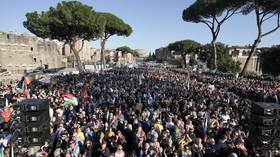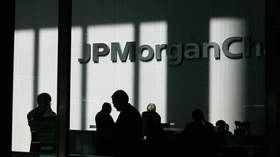Assange verdict branded as ‘travesty of justice’
Human rights and press freedom activists have fiercely condemned a UK court ruling paving the way for WikiLeaks founder Julian Assange to be extradited to the US where he faces espionage charges.
The UK High Court on Friday granted the US’ request to extradite Assange, a request it had previously blocked due to Assange’s declining mental health. While the ruling is not final and can be appealed by Assange’s legal team, it brings the former WikiLeaks boss one step closer to a trial on US soil, where he faces a possible 175 years behind bars if convicted of espionage.
“These proceedings, and today’s ruling, are a black mark on the history of press freedom,” wrote Trevor Timm of the Freedom of the Press Foundation. “That United States prosecutors continued to push for this outcome is a betrayal of the journalistic principles the Biden administration has taken credit for celebrating,” Timm, who previously testified in Assange’s defense, continued.
Freedom of the Press Foundation response to UK High Court ruling allowing extradition of Wikileaks publisher Julian Assange to continue https://t.co/9JEEcsch3Rpic.twitter.com/aDSuwoEu2D
— Freedom of the Press (@FreedomofPress) December 10, 2021
Reporters Without Borders joined in the condemnation, with Secretary-General Christophe Deloire stating that Friday’s ruling “will prove historic for all the wrong reasons.”
“We fully believe that Julian Assange has been targeted for his contributions to journalism, and we defend this case because of its dangerous implications for the future of journalism and press freedom around the world,” Deloire wrote.
Assange’s plight has long been recognized by free speech and press freedom activists, and the deprivations endured by Assange during his years in detention have been criticized by human rights organizations. Amnesty International’s Europe Director Nils Muiznieks described the court’s decision as “a travesty of justice.”
“If extradited to the US, Julian Assange could not only face trial on charges under the Espionage Act but also a real risk of serious human rights violations due to detention conditions that could amount to torture or other ill-treatment,” Muiznieks wrote.
The High Court granted the US’ extradition request after American prosecutors promised that Assange would not be subjected to so-called Special Administrative Measures while in US custody. These measures include extended periods of solitary confinement, and have been criticized by human rights groups as tantamount to torture.
“We don’t think diplomatic assurances like this are worth the paper they’re written on,” Amnesty’s Simon Crowther explained. “They’re always given by a state when that state has prevalence of torture… that’s a kind of state that shouldn’t be trusted.”
“This case isn’t over yet”@amnesty’s Simon Crowther explains what today’s judgment means & why the #AssangeCase is important for freedom of expressionExtraditing #Assange would have implications far beyond #JulianAssange & would set a chilling precedent.#DontExtraditeAssangepic.twitter.com/QoSP0onrDU
— Stefan Simanowitz (@StefSimanowitz) December 10, 2021
The charges against Assange stem from his communications with whistleblowers, most importantly Chelsea Manning, who gave WikiLeaks classified materials about US wars in Iraq and Afghanistan. Although Assange did not personally hack these materials, he still faces espionage charges for his role in publishing them.














